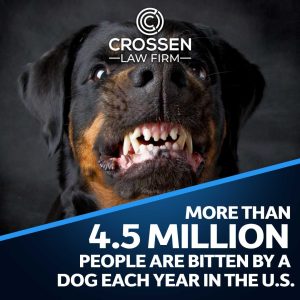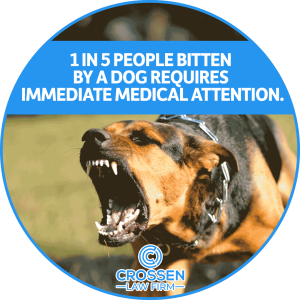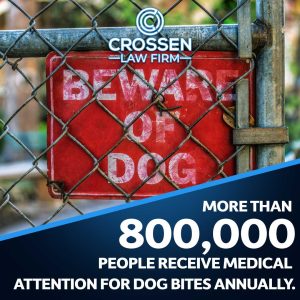Dog Bite Injury Attorney Indianapolis
Crossen Law Firm: Top-Rated Indianapolis Dog Bite Lawyers with a Multimillion-Dollar Track Record

A dog attack can be an incredibly traumatizing experience. Not only do many dog bite victims suffer serious injury, but they can also struggle with psychological injuries after the attack, like PTSD.
If you or a loved one have been attacked and bitten by a dog, our Indianapolis dog bite lawyers at the Crossen Law Firm can help you pursue maximum compensation for your dog bite injuries. Our law firm has decades of experience handling a wide range of personal injury claims, including those involving vicious dog attacks.
Our personal injury attorneys understand that no amount of money can make up for what happened to you, but the financial compensation you receive can alleviate your burdens by helping cover your losses, such as your medical bills and lost income.
To schedule a free consultation with a reputable dog bite injury attorney in Indianapolis, dial (317) 401-8626 now or contact us online.
Dog Bite Statistics

No one wants to imagine that their dog could be capable of attacking someone. Unfortunately, even the sweetest dog could turn viscous and have a bad moment.
To help you understand the seriousness of an animal attack, our dog bite attorneys have gathered these important dog bite statistics:
- Indiana is among the top ten states for the most dog-related injury claims, with 112 dog bite injury claims in 2022.
- More than 4.5 million people are bitten by a dog each year in the U.S.
- More than 800,000 people receive medical attention for dog bites annually.
- At least half of dog bite victims are children.
- 1 in 5 people bitten by a dog requires immediate medical attention.
- There is an average of 43 deaths per year as a result of dog attacks.
Indiana Dog Bite FAQs
Below are some of the most frequently asked questions (FAQs) about dog bites in Indiana. If you have further questions after reading this, please contact us to speak to an experienced Indianapolis dog bite attorney about your dog bite case.
What Are the Dog Bite Laws in Indiana?
Indiana does not have statewide leash laws. Instead, each local municipality is responsible for setting its own local ordinances.
In Indianapolis, dogs are required to be kept on a leash or they must stay within three feet of their owner while in the city. If a dog owner is caught breaking these laws, they can be fined $50.
In Marion County, the law specifically states that it is unlawful for “the owner or keeper of an animal to allow that animal to be at large within the city.” For the purpose of this law, “at large” means not confined without means of an escape in a cage, dog pen, corral, yard, vehicle, house, or other secure enclosure unless otherwise under the control of a competent human being.
How Does Dog Bite Liability Work in Indiana?

Under Indiana law, there are two ways that dog owners can be held liable for injuries caused by their dogs:
- One Bite Rule: Indiana law states that a dog’s owner can be held liable for damages caused by the dog IF the owner “knew or should have known” the dog was prone to attacks. However, the “one bite” rule means that owners typically are not liable for the first bite if they acted in good faith. In other words, if the dog showed no prior vicious behavior and the owner had no prior knowledge of the dog ever having bitten someone before, then the first time the dog bites someone, the owner might not be held liable.
- Strict Liability: Indiana law imposes strict liability for dog bites when the situation involves mail carriers or government employees. A dog owner can be held strictly liable if their dog bites a postal carrier, police officer, or any other state or federal official who is peaceably carrying out their official duties. For example, if a mail carrier gets bit by a dog while delivering the mail, the animal’s owner can be held liable, even if it is the first time the dog has bitten anyone and the owner had no prior knowledge of vicious behavior.
What Are the Penalties for Dog Bites in Indiana?
In addition to being held financially responsible for damages caused by their dog in a claim or dog bite lawsuit, pet owners can also face criminal charges in certain situations.
A dog owner can be charged with a Class C misdemeanor (up to 60 days in jail and/or up to $500 in fines) if:
- The owner recklessly, knowingly, or intentionally fails to take reasonable steps to restrain their dog,
- His or her dog leaves the owner’s property, and,
- After leaving the property, the dog ends up biting or attacking another person without provocation.
A dog owner can be charged with a Class B misdemeanor (up to 180 days in jail and/or up to $1,000 in fines) if they are found liable for a repeat offense of the above.
A dog owner can be charged with a Class A misdemeanor (up to 1 year in jail and /or up to $5,000 in fines) if:
- The owner has been convicted of more than one previous offense.
- The attack results in serious bodily injury to a person.
It is a Class 6 felony (2.5 years in prison and/or a fine of up to $10,000) if the dog owner recklessly violates the laws in this section and it results in the death of a person.
It is a Class 5 felony (1 to 6 years in prison and up to $10,000 in fines) if the dog owner intentionally or knowingly violates the laws in this section and it results in the death of a person.
What Happens to the Dog After an Attack in Indiana?
Indianapolis Animal Care Services, also known as Animal Control, is responsible for enforcing all animal-related laws in Indianapolis, which can include:
- Issuing tickets to owners violating the dog laws
- Impounding loose dogs
- Investigating complaints related to dogs
If it is believed a crime has been committed, a dog can be impounded pending a court hearing. The judge will then decide whether the dog should be confiscated from the owner to protect the public.
What Are the Most Common Dog Bite Injuries?

As experienced Indianapolis dog bite attorneys, we see a lot of cases involving serious dog bites. While a dog bite injury can be minor, even small dog bites can easily become infected. In many dog bite cases, the person bitten can suffer from psychological injuries in addition to physical personal injury.
Some of the most common dog bite injuries we see as dog bite lawyers include:
- Puncture wounds
- Broken bones
- Permanent scarring
- Severe facial injuries
- Tissue and nerve damage
- Infections
- Psychological trauma (anxiety, PTSD, etc.)
If the dog bite victim was bitten by a dog with rabies, they might need to undergo an expansive and painful regimen of shots. Indiana law requires all dogs to be vaccinated against rabies, but a stray dog can be unvaccinated or an owner could have failed to get their dog the vaccination.
How Much Compensation Can I Recover for a Dog Bite Injury in Indiana?
If you are attacked and bitten by someone else’s dog, you can file a dog bite claim against the at-fault owner. That person will then be held financially liable for the damages you have suffered as a result of the dog attack. In some cases, the negligent dog owner’s homeowners or renters insurance company may cover your expenses depending on the policy they hold.
In most dog bite cases, liability limits tend to range from $100,000 to $300,000. If your damages exceed the policy limits, then you may be able to file a lawsuit against the dog owner for all other damages above that amount.
However, each dog bite claim is unique. How much money you are owed will depend on the specific damages you have suffered and the extent of your injuries. Family members may also be able to file claims for their loved ones who were injured or killed in a dog attack.

Generally, the damages that are recoverable for dog bite claims can include, but are not limited to:
- Medical expenses
- Current and future medical bills related to the dog bite injury
- Lost wages (if you miss work while recovering)
- Reduced earning capacity (if the injury leaves you disabled and unable to work)
- Property damage
- Therapy expenses (from emotional trauma)
- Physical pain and suffering
- Mental anguish
- Scarring and disfigurement
It’s important to understand that while you may be entitled to the above damages, it is not uncommon for dog owners or their lawyers to try to use certain defenses to get out of carrying any responsibility for what happened. For example, they may try to claim that you provoked the dog in some way or that you were trespassing when the dog bit you.
For these reasons, it may benefit you to hire your own experienced dog bite attorney. Even the insurance company may try to use tactics to get out of paying you the fair settlement you deserve. If you want to increase your chances of winning and recovering fair and just compensation for your injuries and other potential damages, you should consult an Indiana dog bite attorney.
At Crossen Law Firm, we know how to fight against negligent dog owners who try to use defenses against you to deny your claim. We also know how to fight insurance companies that unjustly deny compensation. Being bitten is traumatic enough — you don’t need the extra stress of having to argue with a recalcitrant insurance company for your compensation.
What Are the Most Dangerous Dog Breeds?
Technically, any dog can turn aggressive or act viciously, given the right circumstances. For example, a typically sweet dog could attack or bite if provoked or if they are afraid.
Certain breeds are used more often for situations that lead to them attacking, such as dog fighting, guard dogs, and police dogs.
Because of this, these breeds tend to rank as the top most dangerous dog breeds and include:
- Pit bulls
- Rottweilers
- Boxers
- German Shepherds
- Australian Cattle dogs
In a 15-year period from 2005 to 2019, 521 people were killed by dogs. Of those deaths, 66% were from Pit Bulls, and Rottweilers and Pit Bulls combined contributed to 76% of the deaths.
What Are the Warning Signs of a Vicious Dog?
To prevent dog attacks and bites, it’s helpful to learn how to spot an aggressive animal. In many cases, a dog will give off warning signs that indicate it is more likely to bite or attack, especially if provoked.
Such warning signs to look out for include:
- Lips drawn tight
- Making low guttural barks or growls
- Becoming very still or rigid
- Hackles raised, ears high/tail high
- Lunging forward or looking as if about to lunge or charge
- Looking at you with a fixed stare
What Should I Do After Being Bitten By a Dog?

If you are bitten by a dog, there are steps you should take to protect yourself and keep yourself safe.
These steps can also help you should you decide to file a dog bite claim:
- Call 911 and report the attack/bite to the police.
- If your wounds are severe, seek medical attention for emergency medical treatment.
- If the wounds are not severe, care for the wound yourself by washing the wound in mild soap and warm water, stopping the bleeding with a sterile cloth, and applying an antibiotic cream.
- Even if the wounds do not seem severe, you should still see a doctor as soon as possible to make sure the wound has been properly cleaned and doesn’t need stitches. A doctor might also prescribe you an antibiotic to prevent infection.
- While still at the scene of the attack, ask the dog owner or person responsible for the dog for their contact information.
- You should also ask any witnesses for their contact information in case they are needed for witness testimony.
- Take pictures of your wounds and the dog if possible. The more documentation you have of what happened, the better.
- Keep copies of all medical records related to the treatment of your injuries.
- Contact an Indianapolis dog bite lawyer as soon as possible.
 Explore Your Legal Options With Experienced Indianapolis Dog Bite Lawyers
Explore Your Legal Options With Experienced Indianapolis Dog Bite Lawyers
If you want to hold a negligent dog owner liable and recover compensation for your dog bite injuries, an experienced Indianapolis dog bite attorney can help. At Crossen Law Firm, our team will fight tirelessly on your behalf to ensure you get a fair settlement for the damages you have suffered. You will not owe us anything unless we win your case.
Make the right call. Call Crossen Law Firm at (317) 401-8626 to speak to a personal injury attorney today or contact our firm online.

-
“I honestly don’t know where to start! Trevor is an exceptionable person, he honestly cares for those he works with and his clients! He has completely changed my mind of how lawyers act! He is a man of integrity and I, especially today on thanksgiving, am thankful I chose his law firm to represent me! I highly recommend that you choose Crossen law firm!! Thank you Trevor for all that you’ve done for me and continue to do!”
- Ben Steiner -
“Trevor and His Team Were a "True Guiding Light" for MY Family & I During a Very Difficult and Emotional Time in Our Lives! Thank You Team Crossen”
- Joe A -
“When no one else was there for crossen law firm was. They are great attorneys. I would recommend them to anybody and I would use them again. I had a great experience with them.”
- Codye Hagood -
“I highly recommend Crossen Law Firm. He really cares about his clients and employees.”
- Ariel -
“Very professional,Mr crossen was very helpful through out by process”
- Mr.Maison

Why Crossen Law Firm?

Call our office today at (317) 401-8626 to discuss your case.

 317-401-8626
317-401-8626 
 Explore Your Legal Options With Experienced Indianapolis Dog Bite Lawyers
Explore Your Legal Options With Experienced Indianapolis Dog Bite Lawyers